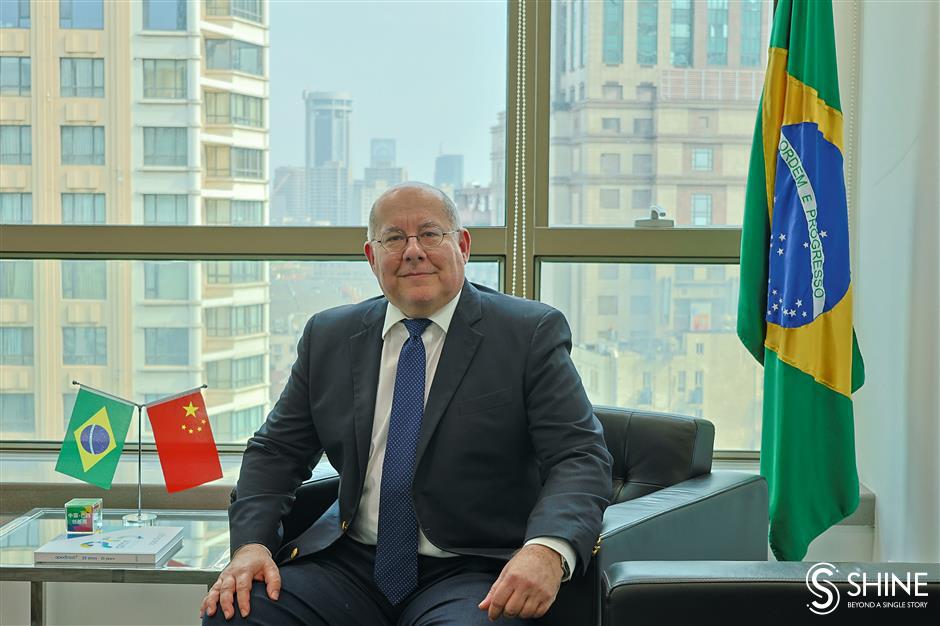Brazilian consul general sees unprecedented growth in trade, ties

According to Augusto Pestana, the Brazilian consul general, Shanghai plays a significant role in the burgeoning relationship between Brazil and China.
Flights covering the 17,584 kilometers between China and Brazil take at least 25 hours, which includes a two-hour technical stop for refueling. Notwithstanding the geographical separation, the movement of people and goods between the two countries on two continents has increased dramatically and rapidly.
In 2023, Brazilian exports to China exceeded US$120 billion, accounting for around a third of the country's total exports. It was a figure that Brazil had never reached with any other country. The number also surprised many Brazilian officials and economists, who had high expectations following the state visit of President Luiz Inacio Lula da Silva to China in April last year.
But it wasn't much of a surprise for Augusto Pestana, who arrived in Shanghai as Brazilian consul general in March 2023, just ahead of the president's state visit. Since then, Pestana has personally witnessed the deeper-than-expected bilateral relations, the unprecedented growth in trade and investment, and talks of the immense potential that lies ahead.
"We are witnessing the creation of history through a pragmatic and mutually beneficial approach," he told Shanghai Daily.
"Many of President Lula's plans during his state visit are already taking shape, particularly in the crucial area of the economy, with numerous initiatives in trade and investment," he added. "This new phase of our long-lasting friendship started with President Lula's visit to Shanghai, which is part of the success story between Brazil and China."
As the two countries celebrate the 50th anniversary of the establishment of diplomatic ties, bilateral trade figures have increased significantly this year. The consul general views it as only the beginning of the new phase of bilateral relations.
"It is nothing compared with the huge potential we see ahead," he explained.
Over a century ago, China and Brazil had already established trade relations. Brazil's main export at the time was coffee, which was a mismatch with China being the tea kingdom.
"Well, look at it today; things have changed," the consul general pointed out of his office window, with a handful of coffee shops close to each other.
"Now there are thousands of coffee shops in Shanghai. How could anyone have predicted this back then? It was a mismatch then, but no longer."
Last year, Brazil's coffee exports to China more than doubled, while China overtook the United States as the largest branded coffee shop market in the world, according to Allegra World Coffee Portal, a global coffee market research provider. Many of these coffee shops combine Brazilian coffee with other Brazilian products.
"Here in Shanghai, you can find Brazilian products everywhere, from iron walls in skyscrapers to acai (pronounced ah-sigh-ee, a berry from the Amazon known for its energetic properties) at local markets, though many people wouldn't see that they are made in Brazil," said the consul general.
He sees it as both a challenge and a mission – to promote Brazilian products as quality offerings to Chinese consumers and to help companies on both sides delve into their huge potential.
He has high hopes for collaborations in various fields, including aerospace, renewable energy, high-tech and electric vehicles, with the surrounding areas within the consulate's jurisdiction boasting strong industries and markets.
The consul general had his eyes on Shanghai long before his arrival last March, when he served as CEO and business director of the Brazilian Trade and Investment Promotion Agency (ApexBrasil) and saw the opportunities in various industries for both large brands and entrepreneurs at small to medium-sized companies.
Before coming to Shanghai, he was told that "if you want to understand ancient China, go to Xi'an; if you want to understand the present, then Beijing; if you want to understand the future of China, you have to go to Shanghai."
"I came with that image, and this super global cosmopolitan city has lived up to my very high expectations," he said. "It offers a very good combination of professional life and personal life, with lots of things happening every day."
Shanghai is also the headquarters of the New Development Bank, formerly known as the BRICS Development Bank, of which Brazil is a founding member country.
"NDB is a very concrete example of what BRICS can achieve, and BRICS has a very concrete role with values we Brazilians and Chinese share," he explained.
"We envision a world based on multilateral institutions. We believe that global problems demand global solutions. We want peace, prosperity and more inclusive globalization, and we need to have a dialogue with everyone. The world is becoming more complicated, so this kind of approach with like-minded countries like China is very important.
"BRICS and the global south show the importance of developing countries having a voice. We need places and platforms to make our voices heard. When we think about NDB, it's not only the voice but also the means and the finances," he said.